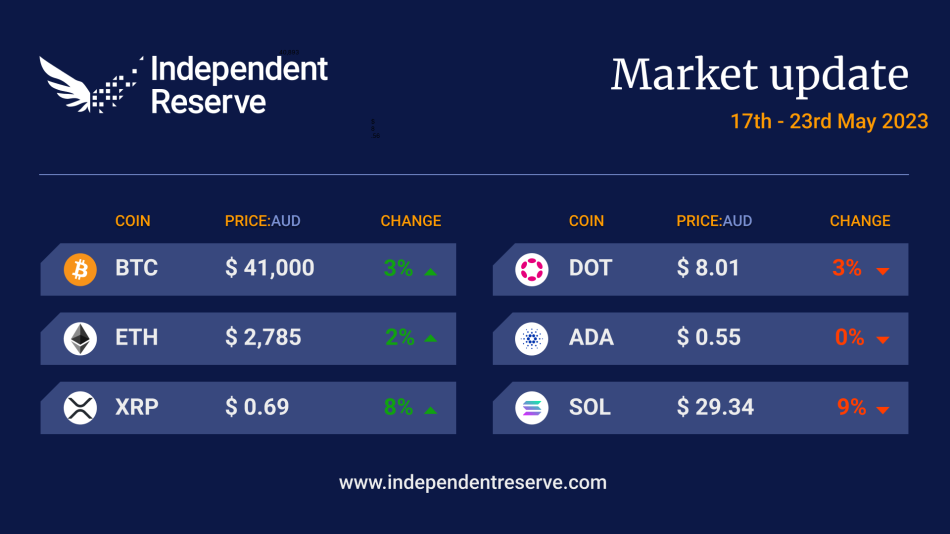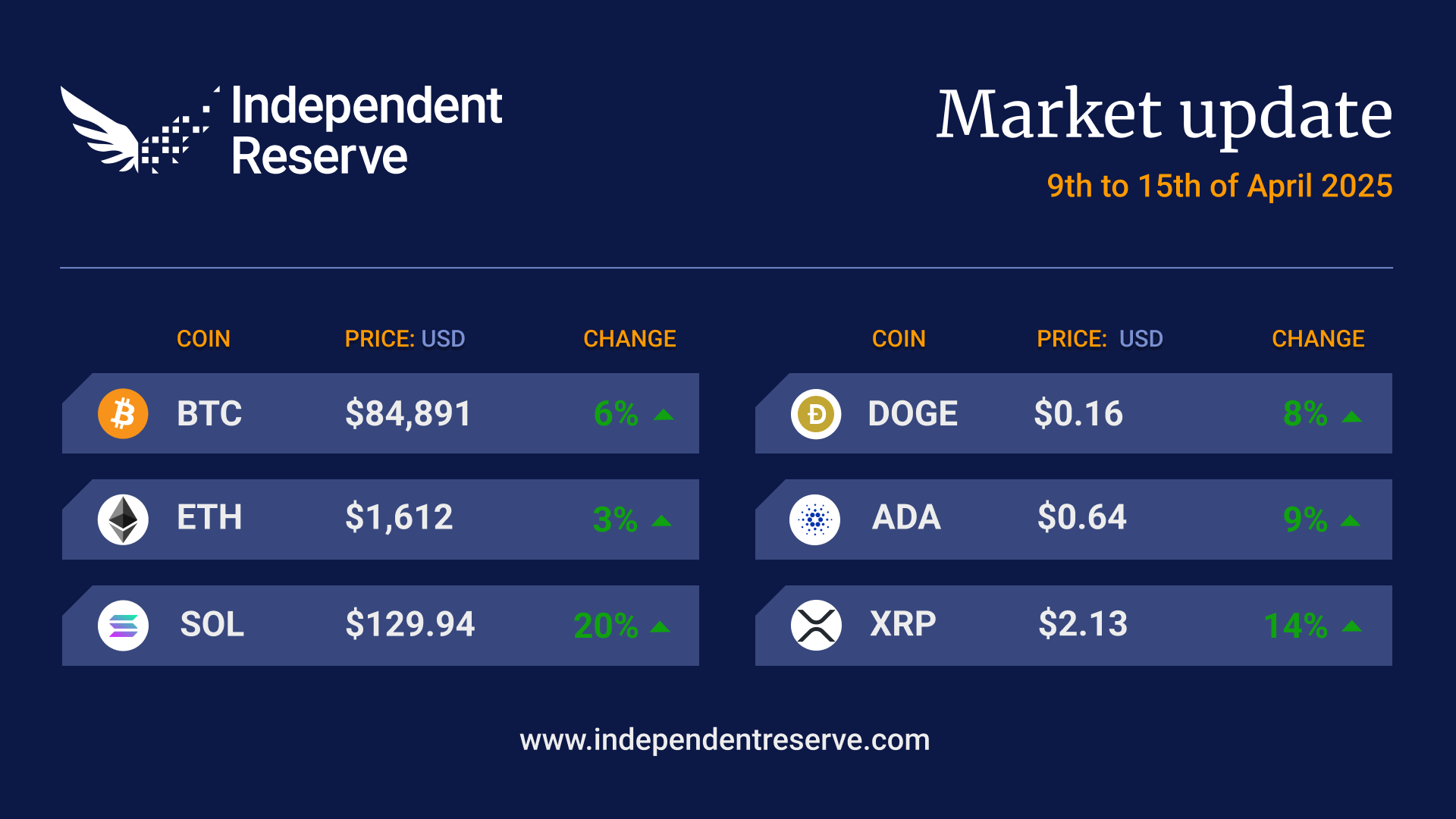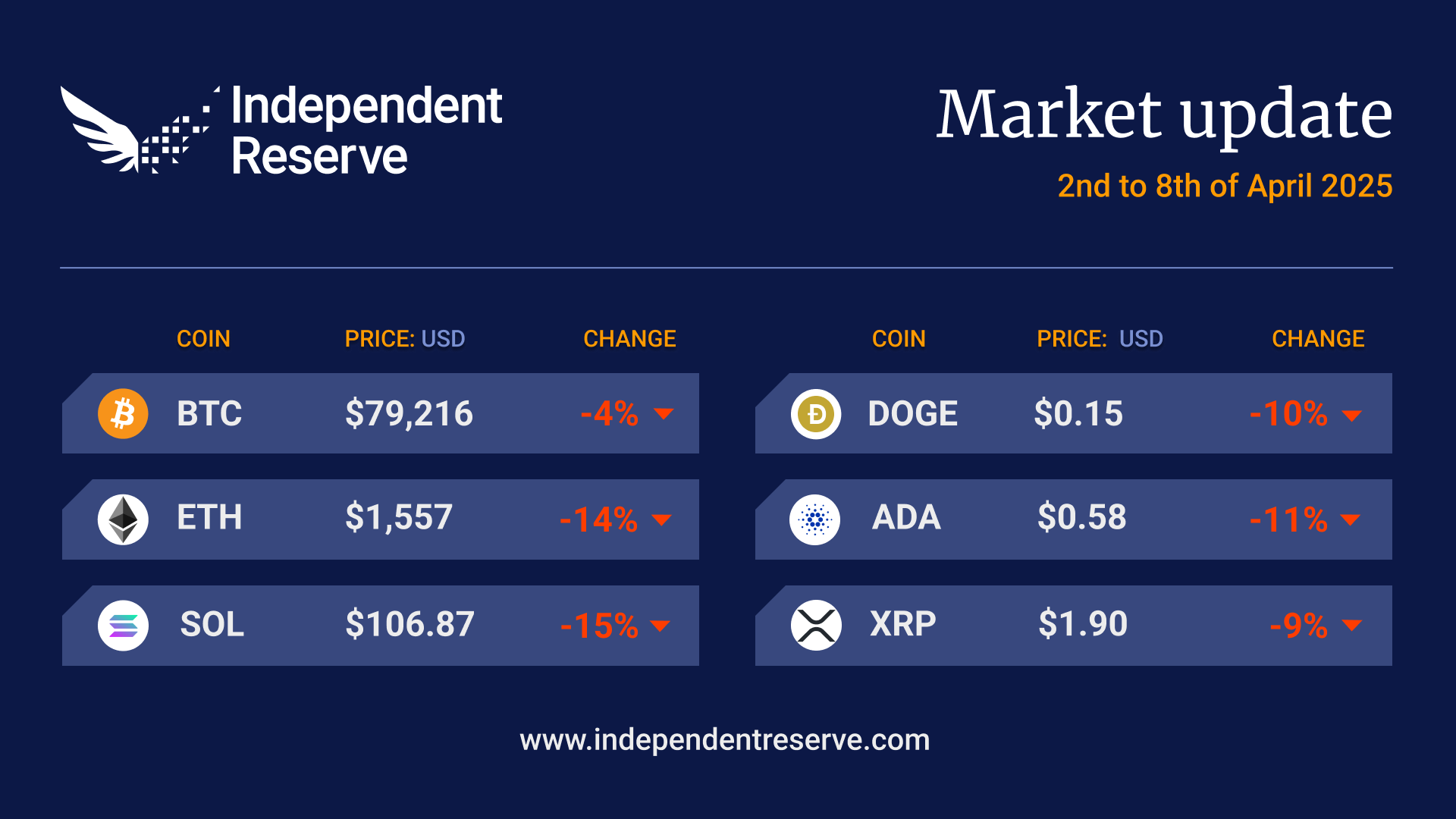Market Update
16th – 23rd May 2023
Welcome back to another crypto market update.
In markets
Crypto markets have been kind of dull lately, with low volatility and little of the usual drama. According to the chart whisperers, the trend is slowly down with Bitcoin in a descending wedge formation since mid-April, with the total market capitalisation for crypto down to A$1.69 trillion (US$1.125T). Analyst Marcel Pechman suggests this bearish formation could last until mid-July. Veteran trader Tone Vays calls it a frustrating “consolidation” but suggests US$34K (A$51.1K) is on the cards in the near term as the halving is less than a year away. Bitcoin consolidated within a tight range of 3.4% over the week, and finishes 1.7% down on the same time seven days ago to trade around A$41,000 (US$27,300). Ethereum was pretty much even at A$2,800 (US$1,850). Ripple gained 8%, Cardano (-1%), Dogecoin (-9.1%) and Polygon (-14.7%). Fittingly, the Fear and Greed Index is at 49 or Neutral.

From the OTC desk
The current state of the market is, well, quite boring (relative to history). While there continues to be a great amount of macro activity, price action of risk assets has been benign – particularly in the digital asset space. US 2yr bonds have slowly been creeping higher, to now trade at 4.34% (relative to a May low of 3.80% just over two weeks ago); The US debt ceiling negotiations are well and truly active, with a June deadline fast approaching; and the FOMC remain divided on whether one more rate hike might be appropriate at the upcoming 14th June meeting. Currently, the US credit default swap (CDS) highlights credit market concern of the risk-free rate. This is incredibly important to the transmission mechanism of credit, and default risk.
In Australia, the Reserve Bank of Australia (RBA) have most recently expressed concern of persistently high core services inflation. Additionally, it is now becoming clearer that the cash rate in Australia of 3.85%, looks out of place relative to other major economies who have the same level (or lesser) inflation. Think the US – who has a current cash rate of 5.25%; New Zealand at 5.25%; England and Canada at 4.5%. With the unemployment rate remaining near 50-year lows (currently at 3.7%), net migration over the 2022-2023 financial year forecast to be near +700k and public sector wage negotiations ongoing, it is looking like there is more work to be done by the RBA.
Important economic data this week includes:
- The Reserve Bank of New Zealand interest rate decision, Wednesday 12:00pm AEST
- The US Federal Open Market Committee Minutes, Thursday 4:00am AEST
- Australian Retail Sales (April), Friday 11:30am AEST
- US PCE Inflation (April), Friday 10:30pm AEST
On the OTC desk, we continue to see large volumes of stable coin selling back to fiat – AUD, USD and SGD. The majority of this is occurring in USDT/AUD, despite USDT trading near 1:1 USD. Flows in alts have reduced, with volatility in BTC and ETH reduced. In general, buyers remain of ETH, while client flow in BTC remains mixed. We expect that, over time, BTC and ETH will continue to trade as high beta risk assets, and profile nicely against US equity performance and bond yields. For the time being, however, these risk-based correlations seem to have broken down. Watch for USDT trading above 1:1 USD as a market leader for alt allocation.
For any further information, please feel free to reach out.
In headlines
Bitcoin pizza day
This week marks the 13th anniversary of Bitcoin Pizza Day, the seminal event in which programmer Laszlo Hanyecz bought two pizzas for 10,000 BTC, marking the first time Bitcoin was used to pay for something in the real world. Rough back of the envelope calculations suggest that the BTC used to pay for the pepperoni alone would now be worth US$6.5 million (A$9.8M). Bitcoiners around the world celebrated with pizza events from Bali to Bondi and the Gold Coast, while scammers celebrated with US$200,000 (A$300K) worth of pizza related token rugpulls and honey pots.
Will Ledger recover?
The crypto community was up in arms this week about a new update to Ledger hardware wallets that introduces a way for users to back up their seed phrases with third party entities. The fact the seed phrase can leave the device upset many Bitcoiners who didn’t realise this was possible. However, as a programmable device, this has always been something that is possible for Ledger to do (with a signed firmware update) meaning users have always needed to put some trust in the company. Co-founder and ex-CEO Éric Larchevêque posted on Reddit that “Some amount of trust must be placed into Ledger to use their product” and that “Ledger is still safe, there is no backdoor.” He added that no one is being forced to use the Recover service. Ledger also admitted that the recovery services could technically be subpoenaed to access a private key. A few days later Metamask had to put out a statement to squash unfounded rumours that its terms of service had changed to enable it to collect taxes for the government on crypto transactions.
Debanking industry
Aussie crypto users were alarmed by the news that Binance has suspended Australian dollar services after payment provider Cuscal cut it off. Westpac then announced it was suspending customer payments to some overseas exchanges, including Binance, in order to reduce customer losses to scams. However, the other major exchanges in Australia report they have not had any related payment issues or been debanked. Independent Reserve CEO Adrian Przelozny told Cointelegraph he doesn’t think “this an industry-wide issue, as it appears to be Binance-specific,” adding the Australian dollar deposits and withdrawals for Independent Reserve “remain uninterrupted.”
Ripple gets a win in court
The SEC’s case against Ripple for selling unregistered securities is one of the most important in crypto’s history. The deck has always been stacked against Ripple as the SEC tends to win such cases. However this week, the judge in the case refused the SEC’s motion to seal records of its internal deliberations relating to a speech by former director William Hinman. Hinman famously declared Ethereum and Bitcoin were not securities and the internal discussions are believed to reveal a range of dissenting opinions from SEC officials about which cryptocurrencies were, and were not, securities. “We know that some senior officials at the SEC discussed that there was a reasonable basis to conclude XRP was not a security,” said CryptoLaw founder John Deaton. “And if SEC staff believed XRP was not a security, it’s reasonable for Ripple to believe the same.” A win — which is far from guaranteed — would also bolster Coinbase’s chances of victory in a similar case brought by the SEC.
Singapore DLT pilot for currency transfers
The Monetary Authority of Singapore and the Federal Reserve’s New York Innovation Centre teamed up to trial out distributed ledgers for cross border payments. The results of the badly named trial — Project Cedar Phase II x Ubin+ (Cedar x Ubin+) — found that DLT can efficiently execute cross-border payments that involve multiple currencies, according to the Straits Times. Deputy managing director of markets and development at MAS, Leong Sing Chiong said the experiment looked at the viability of central banks using wholesale CBDCs to “facilitate more efficient cross-border payment flows, including for less liquid currencies, without requiring a common infrastructure.”
Crypto election issue
President Joe Biden cancelled his trip to Australia to deal with the looming debt ceiling standoff, which, if not resolved, could see the US Government run out of money in June (most observers expect a deal will get done, but JPMorgan warns the risk of default is “non zero.”) On the final day of G7 talks in Japan, Biden said that he’d rather blow everything up than “agree to a deal that protects wealthy tax cheats and crypto traders while putting food assistance at risk [for Americans].” Biden appears to think he’s on a winner attacking crypto traders. Two weeks ago he tweeted about closing tax loopholes for “wealthy crypto investors”, referring to a ban on wash sales (that’s where you sell crypto assets before tax time to claim a loss and then buy them back straight away, which is already verboten in Australia). Interestingly two much younger Presidential candidates, Robert F Kennedy Junior and Vivek Ramaswamy, have become the first two candidates ever to announce they will accept Bitcoin donations via Lightning for their campaigns.
Until next week, Happy Trading


